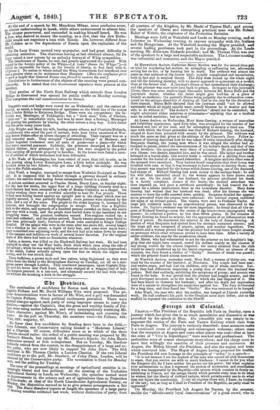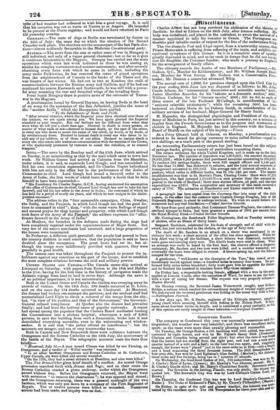ffortign anb Colonial.
FRANCE.—The President of the Republic left Paris on Sunday, upon a journey which has given rise to as much speculation and discussion as was provoked by his speech at Ham. Ills ostensible aim was simply to in- augurate the section of the Paris and Nantes Railway which runs from Paris to Angers. The journey is variously described: some accounts make it a continued scene of rejoicing and extravagant welcome; others state that the reception at Angers and some other places was cool—that at least the cries of " Vive la Republique!" were marked and predominant. The authorities were of course obsequious everywhere; and the clergy seem to have lent willingly the sanction of their presence and assistance. At Angers, the Bishop blessed the President, and also the engine and train which conveyed him. The Mayor of Angers having proposed his health, the President did new homage to the principle of "order," in a speech-
" It is not because I am the nephew of the man who caused all civil dissensions to cease, that you receive me with so much kindness: I cannot do for you what the Emperor did, for I have neither his genius nor his power: but what explains your acclamations is, that I represent the system of moderation and conciliation which was inaugurated by the Republic—the system which consists in firmly es- tablishing in France, not the savage liberty which permits every man to do what he wishes, but the liberty of civilized nations, which permits every one to do what does not injure the community. Under all regimes there will, I know, be victims of the law ; but, so long as I shall be President of the Republic, no party shall be oppressed."
On Monday, the President left Angers for Nantes, by the steamer, amidst the "affectionately loyal demonstrations" of a great crowd, who in
sPite.of bad weather had collected to wish-him a good voyage. It is said that his reception was not so warm at Nantes as at Angers. He intended to be present at the Ilavre regattas; and would not have returned to Paris till yesterday evening.
GERMANT.—The state of siege at Berlin was terminated by decree on the 26th of July; the same day on which the election of this -Second Chamber took place. The elections are the counterpart of the last Paris elec- tions—almost uniformly favourable to the Moderate Constitutional party.
AUSTEIA.—The news from the seat or rather seats of war in Hungary is still indistinct, and only of a vague general character; but so far as it goes it continues favourable to the Magyars. Georgey has carried out the main operations which were last week indicated as those he was aiming at, amidst his complex movements and counter-movements; and after severely chastising every force with which he came in collision, including the army under Paskiewicz, he has removed -the scene of grand operations from the neighbourhood of Comorn to the banks of the Theiss and the war theatre of last winter. He had cut in two at Kaschau the stalk of communications between the Russian army and Gallicia; and if he had not continued his course Eastwards and Southwards, he was still with a power- ful army menacing the rear and detached wings of the invading force. From South Hungary there is positive news of the surrender of Temes- war to the Magyars.
A proclamation issued by General Haynau, on leaving Buda at the head of an army for the assistance of the Ban Jellachich, justifies the name of the "modern Attila " which the Hungarians have applied.
" To the Inhabitants of Buda and Pesth.
"After several victories, which the Imperial arms have obtained over those of the traitors, we are again among you. We have again planted the Imperial standard on your steeples. But our feelings are far different from what they were when we left you a short time ago. Doomed to death is every person, no matter of what rank or sex—doomed to instant death, on the spot of the crime, is every one who dares to assist the cause of the rebels, by words, or by deeds, or by revolutionary dress. Doomed to instant death is every one who dares to in- sult any of my soldiers, or of those of our allies. Doomed to instant death is every one who enters into traitorous communication with the enemies of the Crown, or who maliciously presumes by rumours to assist the rebellion, or to conceal weapons."
Henn.—The news by the Bombay mail of the 25th June, which arrived on Sunday, is as uninteresting as that by the mail which came to town last week. Sir William Gonna had arrived at Calcutta from the Mauritius, under orders, it is said, to supersede Lord Gough; and was astonished to find his own commission superseded, and Sir Charles Napier beforehand with him not only in the office but in the performance of the duties of Commander-in-chief. Lord Gough had issued a farewell order to the Army of India; the first words of which leave hardly a doubt that he feels himself to have been superseded-
" His Excellency Sir Charles Napier, G.C.B., having announced his assumption of the office of Commander-in-chief, General Lord Gough has now to take his last farewell, and bid his last adieu to the Army in India ; the command of which he has held for a period of nearly six years, and which he now resigns to his distin- guished successor.'
The address refers to the "four memorable campaigns, China, Gwalior, the Sutlej, and the Punjaub, in which Lord Gough has had the good for- tune to command in chief "; thy, " with the same warm feelings of regard and earnest prayer for their hmktar and prosperity, with which Lord Gough took leave of the Army at the 4ejaub,' the address expresses his "affec- tionate farewell to the Army of India."
At Mooltan, the breaches in the defences made during the siege had been completely repaired under the superintendence of Major Scott. But very few of the native merchants had returned, and a large proportion of the houses were unoccupied.
In Peshawar, a different spirit prevailed: the people had poured in from the country districts in such numbers, that the population is said to have doubled since the occupation. The great heats had set in; but al- though the troops were indifferently provided with quarters, they were generally in good health.
The utmost care was taken throughout the Punjaub to protect the in- habitants against any exactions on the part of the troops, and to establish the most complete relations between the civil and military powers. UNITED STATES AND CANADA.—The Canada steam-ship arrived at Liverpool on Saturday, with papers from Boston to the 18th and Halifax to the 21st; having for the first time in the history of navigation made the Atlantic voyage from land to land in seven days. Although the news is of no political importance, it is not uninteresting.
Both in the United States and Canada the cholera was sweeping away its crowds of victims. On the 13th July, 190 deaths occurred at St. Louis; and on the same day 154 deaths occurred at Cincinnati. At Montreal, the disease had broken out amongst the garrison; and the medical staff had memorialized Lord Elgin to direct a removal of the troops from the city; but, "in view of his position and that of the Government," the Governor- General refused compliance. At Quebec also the disease had prevailed fatally; and had been the indirect cause of popular outbreaks. A report had spread among the populace that the Cholera Board meditated turning the Customhouse into a cholera hospital; whereupon a mob of 2,000 persons, to save the building from such a desecration, broke into it and demolished everything moveable, even to the wainscoting and window- sashes. It is said that " the police offered no interference ": but the accounts are meagre, and not of very trustworthy tone.
Both in Canada and New Brunswick there were collisions between the Orangemen and the Roman Catholics on the 12th July, the anniversary of the battle of the Boyne. The telegraphic accounts state the facts thus briefly- " Montreal, July 16.—A man named Clunan was killed by one Fleming, an Orangeman; and a verdict of Wilful murder' was returned. " In an affair between Orangemen and Roman Catholics at St. Catharine's, Upper Canada, six were killed and several wounded. On the 12th, they had a street skirmish at Hamilton, and nine were killed." The New Brunswieker gives brief details of a conflict. An armed Orange procession marched forth with Anima and -flags; and on their route the Roman Catholics erected a green archway, under which the Orangemen passed without fray. Before the Orangemen returned, the Mayor went with assistance " to remove the obstruction "; he was opposed and stoned ; and the Orangemen returning, there was a general onslaught of the two factions, which was only put down by a company of, the First Regiment of
Royals. Ten or twelve persons were killed or wounded. Numerouli
arrests had been made, and inquiry was on ibot. •



























 Previous page
Previous page